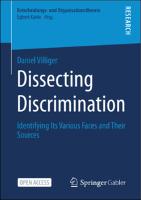Dissecting Discrimination
Identifying Its Various Faces and Their Sources
Author(s)
Villiger, Daniel
Collection
Swiss National Science Foundation (SNF)Language
EnglishAbstract
This Open-Access-book examines the phenomenon of discrimination using a descriptive approach. Discrimination is omnipresent, whether it is people who discriminate against other people or, more recently, also machines that discriminate against people. The first part of the analysis employs decision theory on discrimination, leading to two fundamental subtypes: taste-based discrimination and statistical discrimination. The second part links taste-based discrimination to social identity theory, demonstrates that not all taste-based discrimination is ultimately statistical discrimination, and reveals the evolutionary origins of our tastes. The third part surveys how people get their beliefs for statistical discrimination and thereby shows that they often deviate from Bayesianism: they have inherent prior beliefs and do not exclusively update their beliefs according to Bayes’ law. Additionally, the analysis of belief formation highlights the importance of the learning environment. The last part reassembles the previously dissected aspects of discrimination, presents a new descriptive model of discrimination, and lists five implications for a normative theory of discrimination.
Keywords
Bayesianism; intergroup behaviour; parochial altruism; statistical discrimination; taste-based discrimination; Open AccessDOI
10.1007/978-3-658-34569-3ISBN
9783658345693, 9783658345693Publisher
Springer NaturePublisher website
https://www.springernature.com/gp/products/booksPublication date and place
2022Grantor
Imprint
Springer GablerSeries
Entscheidungs- und Organisationstheorie,Classification
Business ethics and social responsibility


 Download
Download Web Shop
Web Shop